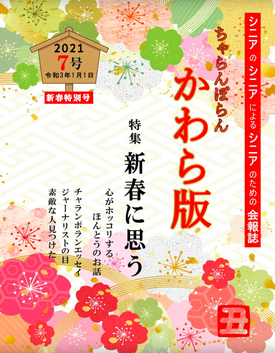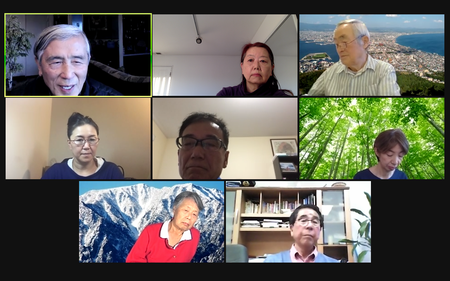"I have to do something."
One day, an acquaintance of mine, Shinya Miyata, a former president of an advertising agency, posted on social media about a Japanese-language publication aimed at seniors. It was the newsletter "Kawaraban" of the "Charan Poran no Kai," an organization he is a member of, which was founded by a core group of new generation seniors living mainly in Los Angeles. When I looked at the online version, I found it to be very rich in content, including essays, senryu poems, and restaurant columns. I was immediately interested in this group. So I asked Shinya Miyata to arrange a Zoom interview with the group's founders, Kinichi Torii and Akira Tsurukame.
Torii explained how he started the group: "Five or six years ago, Kumota-san (Kumota Yasuo, known as Mr. Tofu) came to me and said, 'We have to do something.' In fact, I was planning to move back to Japan from the US. I went back to Japan all the time, but when I met my friends from college, I felt that there was something different about the image of Japan I had. I guess you could say that seniors living in Japan are a different race; they have the ability and time, but surprisingly few of them want to contribute to society. I myself have run a health food company in the US for many years, and I am interested in health, so I thought about running a 'Longevity and Health Association' in Japan, and we met up with about 18 people and had several discussions, but it just didn't feel right. Japanese people think that if you're not healthy, you just go to the doctor. But I think you should protect your own health."
Publication of newsletters, lectures, beach cleaning
Thus, Torii, who had initially been preparing to start a health group for seniors in Japan, felt a discrepancy in the way his thinking differed from that of Japanese seniors, and agreed with Kumota's call to "do something," and decided to start a senior group not in Japan, but here in Los Angeles, America. The name "Chanranporan no Kai" (Chanranporan Group) was chosen in a paradoxical way, as Kumota was a very earnest person, and so "Charanporan" would be a good choice."
Unfortunately, Kumota passed away in 2020, so Torii, Tsurukame, Miyata, Tsuchida Saburo, Ishiguchi Rei and others are currently holding regular meetings and continuing their activities. Tsurukame introduced the activities: "We have held social gatherings for members, lectures by Kitaoka, a journalist who was previously active in the United States, exchange meetings with children at the Japanese school Nishiyamato Gakuen, and even beach cleanups by volunteers to keep the ocean clean. We also publish a journal four times a year. Since the COVID-19 pandemic, we have also published a special edition to provide information to members."
The journal "Kawaraban" is printed in 1,000 copies each time, and can also be read online on the association's website, as mentioned above. "Initially, we thought we would achieve our goal if we could publish 10 issues," but currently, seven issues have been published. It seems that we will be able to achieve our goal without any problems.
When I asked how they increased their membership and readership, they replied that they started by distributing the magazine to places with a large senior population, such as Little Tokyo Tower, the Japanese Pioneer Center, Sakura Garden, and the Southern California Gardeners Association, and eventually word of mouth led to inquiries about mailing the magazine. There are no membership fees or subscription fees, but donations sent in are used to cover printing and postage costs. All of the management team are volunteers. Kitamura Aya and Saeki Kazuyo, who are not of the senior generation, volunteer to run the secretariat, edit the newsletter, and manage the website.
"The joy of helping others"
As Torii says, "You should take care of your own health," if you can find something to devote yourself to, whether it's work, a hobby, or volunteering, even as a senior, it will surely be a major factor in maintaining a healthy mind and body. Also, the following words of Tsurukame struck me deeply. "It is a great joy to be of service to others." Those words brought back memories all at once. I met Tsurukame about 25 years ago during an interview, and he told me that at the time he had been volunteering at the Torrance YMCA as a fundraiser for many years. He told me, "While I'm involved in my own business, I also make time to volunteer. Not only is it a joy to be of service to others, but volunteering is also very meaningful in the sense that it gives back to the society that has accepted me and allowed me to live." In terms of being of service to others, Charanporan no Kai, which provides information and a venue for events, must be extremely useful to seniors.
Furthermore, they plan to hold smartphone study sessions for senior members in the future. "As long as you can use a smartphone, you can watch various videos and participate in Zoom meetings. Our goal is to support seniors to live bright, healthy, and positive lives. Due to the effects of COVID-19, the world is small and limited for seniors who cannot use smartphones. So I want them to be brave and realize that if they learn and start doing things, it's actually not a big deal," says Tsurukame.
Torii-san has been living in the US for 58 years, and Tsurukame-san for 55 years. They are my seniors in American life. I hope that they will continue to work hard for seniors living in the US for many years to come.
Charanporan Association website: http://charanporanusa.com
© 2021 Keiko Fukuda







